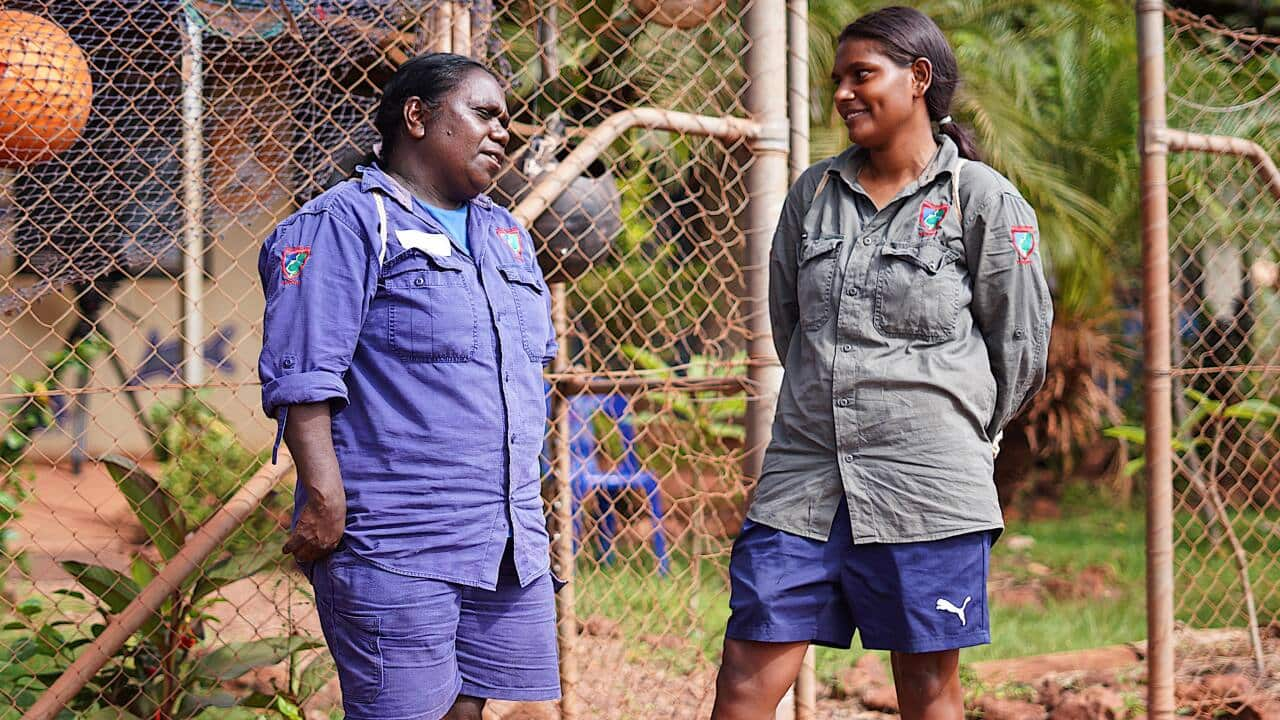Indigenous rangers are being given skills that could make the difference between life and death for visitors travelling into the sparsely populated Northern Territory bushland.
Mariah Daly works as a Thamarrurr Ranger in Wadeye, about 400 kilometres south-west of Darwin. She and her family moved there from the territory’s Daly River region to reconnect with Country and culture.
“I grew up in Daly but have been living on the Tiwi Islands for a few years with my partner and kids,” she told SBS News. “My partner's grandfather is originally from Wadeye, so we thought we’d bring our kids back to learn history and culture.”
The Thamarrurr Rangers was established in 2001 by the Traditional Owners of the Thamarrurr region to address land and sea management issues. The initiative is part of the Thamarrurr Development Corporation and employs more than 17 local Indigenous staff and four non-Indigenous support staff, with rangers working across 18,000 square kilometres of Country and 240 kilometres of coastline.
The initiative is part of the Thamarrurr Development Corporation and employs more than 17 local Indigenous staff and four non-Indigenous support staff, with rangers working across 18,000 square kilometres of Country and 240 kilometres of coastline.

Thamarrurr Rangers HQ in Wadeye. Source: Aneeta Bhole/SBS News
As a ranger, Ms Daly has been given basic first aid training but hoped to broaden those skills in case she came across a serious accident.
She is now one of a dozen rangers in Wadeye to recently receive critical trauma training as part of a course being rolled out by aeromedical service and charity Careflight across the territory.  “It gives you more confidence in yourself as an Aboriginal person working on your land,” she said. “Knowing your land is going to be safe and taken care of makes you feel proud."
“It gives you more confidence in yourself as an Aboriginal person working on your land,” she said. “Knowing your land is going to be safe and taken care of makes you feel proud."

Rangers learning how to apply a tourniquet. Source: Aneeta Bhole/SBS News
The trauma course has been running since 2011 but was traditionally delivered to frontline workers. Now, the program has been adapted to be more culturally sensitive and better suit the needs of the curators of the land.
Victoria Higgins works as a nurse for Careflight and provides the training. She said it’s imperative that they teach the skills in the right way.
“There’s a lot of Aboriginal learning styles,” she said. “I think that when we’re looking at teaching this course in the Top End, especially in really remote areas where the population is Indigenous, we need to account for those learning styles.”
Ms Higgins said the course was originally quite theoretical and mostly indoors.
“Now we’ve put in lots more hands-on stuff, lots more scenario simulation-type training, and a lot of time to be able to tell stories because research shows that’s how people learn.”
Wadeye is only one of several communities the team has visited but like many remote regions in the territory, it only has one clinic in town.
The nearest hospital with blood is in Darwin which can make it difficult for emergency services who are trying to access those in need when time is of the essence.
“So we’ve taught the rangers things like how to pack wounds, how to find an artery that’s bleeding, put some pressure on it and then pack the wound,” Ms Higgins said. “We’ve also taught them how to apply a tourniquet [a device to limit bloodflow], when to apply a tourniquet, why you’d apply a tourniquet and how to make a tourniquet out of things that they may have laying around.”
“We’ve also taught them how to apply a tourniquet [a device to limit bloodflow], when to apply a tourniquet, why you’d apply a tourniquet and how to make a tourniquet out of things that they may have laying around.”

The trauma course is making a difference in the field. Source: Aneeta Bhole/SBS News
Careflight nurse Jayne Sheppard said the course has really made a difference in the field.
“If you’ve got the capability, you’ve got the knowledge and the confidence, you can start those lifesaving procedures,” she said. “They’re things like stopping bleeding, getting people out, keeping them safe and keeping everybody else safe”
“We also look at how to assist with the airway breathing and how to move people. We’d probably do these exact things when we arrive so they can start the treatment before we even get there.”
National NAIDOC Week (8–15 November 2020) celebrates the history, culture and achievements of Aboriginal and Torres Strait Islander peoples.
Join SBS and NITV for a full slate of . For more information about NAIDOC Week or this year’s theme, head to the .
#NAIDOC2020 #AlwaysWasAlwaysWillBe











